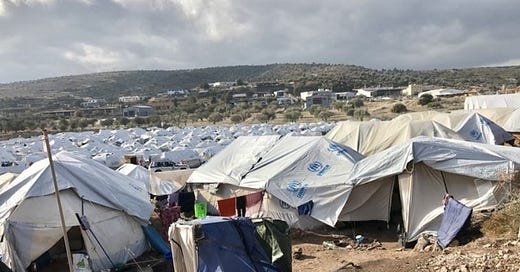Servus!
Christoph Schönborn, archbishop of Vienna and until this year chair of the Austrian Conference of Bishops, used his most recent column in the popular freesheet Heute to issue an appeal aimed directly at the government. 7,300 people continue to languish in the Kara Tepe refugee camp on the Greek island of Lesbos, expanded after a devastating fire wiped out the nearby Moria encampment in September. One third of Kara Tepe’s residents are children. And winter is upon us.
The government, Schönborn acknowledged, has committed to sending much-needed aid to the camp. But that is not enough. Local governments and the church have declared their readiness to accept and integrate families currently living in Kara Tepe. Though Austria cannot save every refugee, in the spirit of the season, it is Schönborn’s view that the country should admit 100 families with children and grant them asylum: “We cannot ignore the sound of those seeking shelter knocking upon the door. Jesus was one of them once.”


The pictures coming out of Kara Tepe II capture misery and squalor. The cold wind from the sea whips against the tents. In times of heavy rain, their tents flood, leaving refugees without a clean, warm place to bed down for the night. Mothers wash their children’s clothes in the sea in the absence of clean running water. Kara Tepe, like Moria before it, is no place to live; without a dramatic change in conditions on the ground, the situation cannot hold. Austria’s liberal-left agrees, with the Social Democrats, Greens, NEOS, and civil society organizations lining up with the church to favor taking 100 families out of Kara Tepe.
Do not, however, expect a change in Austrian government policy this Christmas. The question of whether Austria should take in 100 families first came up in the late summer when Moria burnt to the ground. Though as I say, the Greens—a governing party—supported taking in refugees and many municipalities including Vienna indicated their willingness to pitch in and do their part, the People’s Party, the dominant coalition partner, said no. Austria, the argument went, did enough in 2015 and the years that followed when it came to refugee absorption. Now the doors are shut. Refugees would henceforth be helped on site, lest Austria become a magnet for asylum seekers.
The schism between Schönborn and the People’s Party—the party of the Catholic camp in Austria, one should remember—is indicative of how chancellor Sebastian Kurz has changed the party in the years since he became leader in 2017. Its old and once-dominant Christian democratic or ‘Christian social’ tendency, marked by its commitment to a certain political consensus, has been completely marginalized. It lives on in certain western states like Vorarlberg but has absolutely no purchase at the federal level.
Though there are arch-Catholics in Kurz’s inner circle and the party often adopts conservative views on social issues like marriage equality, on the refugee question, the party line is dictated not by moral or religious concerns but rather political ones. The majority of Austrians are opposed to taking in any further refugees from Moria, Kara Tepe II, or anywhere else. And that is that. In this respect, the contemporary or ‘new’ People’s Party is unrecognizable to a Christian democrat like German chancellor Angela Merkel, who still takes a markedly different view on migration and borders to her colleague to the south.
“And she brought forth her firstborn son, and wrapped him in swaddling clothes, and laid him in a manger; because there was no room for them in the inn” (Luke 2:7). The search for shelter is not only part of the nativity of Jesus of Nazareth, Schönborn would like to remind the government. Those in search of a bed for the night are rapping at Europe’s door. But no matter.
Bis bald!
Do you know someone who would be interested in receiving the Vienna Briefing? Consider sharing it with them today.
Third Lockdown
Austria will go into its third lockdown on December 26. Shops, hairdressers, nail salons, museums, zoos, and libraries will close once more, having re-opened after the second lockdown on December 7. The lockdown will last until January 25. However, if Austrians participate in mass testing scheduled for January 15-17, they will be allowed out of lockdown a week earlier beginning January 18.
Last Flight
At midnight Tuesday, Austria introduced a landing ban on flights from the United Kingdom in response to the mutant strain of the coronavirus spreading throughout London and the south-east of England. The final Austrian Airlines flight out of London was fully booked on Monday.
Two Arrests
Two men were arrested Friday in connection with the investigation into November’s terror attack in Vienna that left four dead and 22 injured. The first, identified via DNA evidence, is described as a 26-year-old Austrian citizen with Afghan roots. The second is a Chechen male known to Austrian authorities, according to a report published in the Kronen Zeitung.



